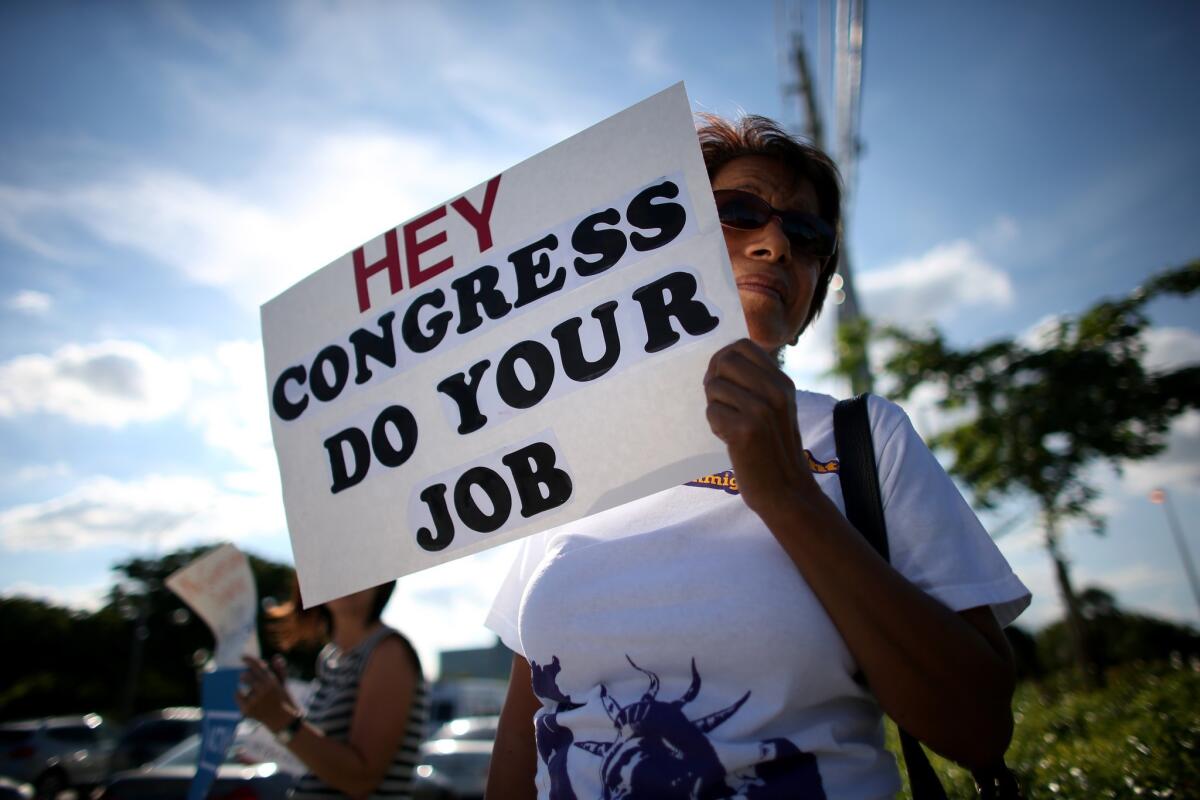Congress: The joke’s on us

In 1942, the popular detective fiction writer Rex Stout published a book about Congress featuring “the silliest, stupidest and most dangerous statements that have ever been made by men laying claim to being leaders of the American people.” The book’s title told the whole story: “The Illustrious Dunderheads.”
I’ve been thinking about Stout during the government shutdown, which has triggered a fresh round of ridiculing Congress. But the joke is on us, as comedian Jimmy Kimmel recently noted. “Congress is still getting paid,” Kimmel jibed. “I want the names of the idiots who elected these people.... Oh, wait. It was us? Never mind.”
For the last two centuries, we have asked members of Congress to advance our personal interests and do the best thing for the nation. When that doesn’t work out, we mock and malign them. It’s a whole lot easier than looking in the mirror.
It’s much more fun too. Visiting in the 1830s, the French nobleman Alexis de Tocqueville was amazed to find Congress full of uncouth, poorly educated people. But that’s democracy for you. It shouldn’t be a surprise that our representatives are representative of those who elect them.
Consider Matthew Lyon of Vermont, who spat in the face of Connecticut’s Roger Griswold during a 1798 debate; a few weeks later, right after the congressional chaplain’s prayer, Griswold attacked Lyon with a cane.
Then there was Ohio’s William “Sausage” Sawyer, who ate sausages during congressional debates and used his pants for a napkin.
The most notorious episode took place in 1856, during the buildup to the Civil War, when South Carolina’s Preston Brooks beat the Massachusetts abolitionist Charles Sumner to a bloody pulp. Several legislators fought formal duels, even after most states had outlawed the practice. Others carried pistols and Bowie knives to the floor of Congress, so they’d be prepared for impromptu skirmishes.
After the Civil War, when the federal government’s size and power grew, congressmen became more notorious for corruption than for belligerence. Cartoonists such as Thomas Nast depicted them as piggish buffoons, living high off the hog. “Suppose you were an idiot,” wrote Mark Twain. “And suppose you were a member of Congress. But I repeat myself.”
The 1920s brought another great round of Congress-bashing, led by the redoubtable H.L. Mencken. The Capitol housed only 40 or so people of “genuine intelligence,” Mencken maintained; the rest were “absolutely indistinguishable … from a convention of garage keepers.” To Nicholas Longworth, speaker of the House in these years, such criticism was inevitable. “We have always been unpopular,” Longworth wrote. “From the beginning of the republic it has been the duty of every free-born voter to look down on us, and the duty of every free-born humorist to make jokes at us.”
As Longworth realized, everyone wanted something from their legislature: a job, a tax break, a benefit. But they also wanted congressmen who would look out for the nation as a whole, not just for the narrow concerns of their constituents. Of course, that’s impossible. We can’t all feed at the trough and also keep the country on firm financial footing.
That’s how we arrived at our current predicament. And it brings us back to Rex Stout’s 1942 book. As America went to war against Germany, Stout lampooned legislators who were comparing Franklin D. Roosevelt’s New Deal to Nazism.
Search the headlines today and you can find any number of GOP lawmakers linking President Obama and his healthcare law to fascism. It’s an absurd analogy, of course, and anyone who makes it deserves all the derision they get.
But so do you, dear voters, for electing these clowns in the first place. Congress’ approval rating stands at a historic low of 11%, Gallup reports, but 44% of Americans — exactly four times as many — say they approve of their own representative.
If we really hated Congress, we’d vote the bums out. But we like the loot we get, so we send them back. Then we start the cycle again, ridiculing our representatives for lining their own pockets at the expense of the national future. It’s enough to make a grown man laugh. Or cry.
Jonathan Zimmerman teaches history and education at New York University. He is the author of “Small Wonder: The Little Red Schoolhouse in History and Memory.”
More to Read
A cure for the common opinion
Get thought-provoking perspectives with our weekly newsletter.
You may occasionally receive promotional content from the Los Angeles Times.










